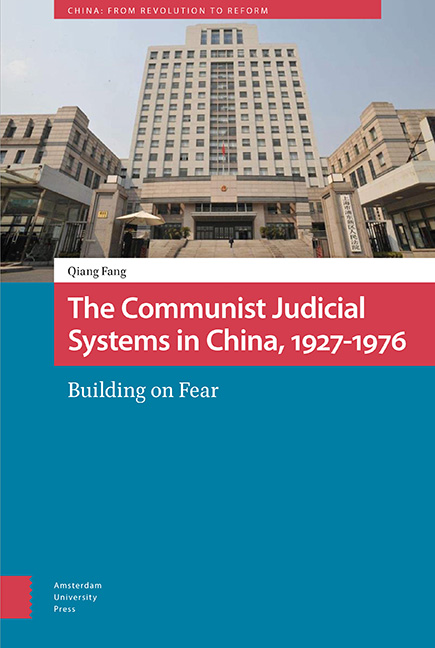Book contents
- Frontmatter
- Contents
- List of Tables
- Dedication
- Acknowledgement
- Acronyms
- Introduction: Building on Fear
- 1 Born in Blood: Origin of the Communist Judicial System in China, 1927–1935
- 2 Cornerstone or Aberration?: The Communist Judicial System during Wars with Japan and the GMD, 1936–1949
- 3 From “Excessive Lenience” to Harshness: The Communist Judicial System in the Early PRC, 1949-1952
- 4 A Deliberate Purge: Legal Reform in the Early PRC, 1952-1953
- 5 A Golden Age?: The Communist Judicial System in China, 1953-May 1957
- 6 The Great Leap of Law: The Communist Judicial System in China, 1957-1965
- 7 Not the Worst Period of Law: The Communist Judicial System in the Cultural Revolution, 1966-1976
- Conclusion: From Party’s Fear to People’s Fear
- Bibliography
- Index
6 - The Great Leap of Law: The Communist Judicial System in China, 1957-1965
Published online by Cambridge University Press: 18 June 2021
- Frontmatter
- Contents
- List of Tables
- Dedication
- Acknowledgement
- Acronyms
- Introduction: Building on Fear
- 1 Born in Blood: Origin of the Communist Judicial System in China, 1927–1935
- 2 Cornerstone or Aberration?: The Communist Judicial System during Wars with Japan and the GMD, 1936–1949
- 3 From “Excessive Lenience” to Harshness: The Communist Judicial System in the Early PRC, 1949-1952
- 4 A Deliberate Purge: Legal Reform in the Early PRC, 1952-1953
- 5 A Golden Age?: The Communist Judicial System in China, 1953-May 1957
- 6 The Great Leap of Law: The Communist Judicial System in China, 1957-1965
- 7 Not the Worst Period of Law: The Communist Judicial System in the Cultural Revolution, 1966-1976
- Conclusion: From Party’s Fear to People’s Fear
- Bibliography
- Index
Summary
Abstract
The role of the judicial system in the period from the Anti-Rightist Movement to the eve of the Cultural Revolution has been studied the least. Most scholarship has centered on the Anti-Rightist Movement, the Great Leap Forward, the 7000-Person Meeting, and the Four Cleanups. This chapter explores a leap forward of law in this period and how judicial cadres in the three principal law-enforcing agencies (i.e. police, procuracy, and court) coordinated and fulfilled their revolutionary missions. It also examines the Communist judicial system in the early 1960s after the Party scaled back its severity and unlawful activities. But the era after the Great Famine was highly volatile and the Party policies were inconsistent and sometimes contradictory. It is argued that the Communist judicial system swung between being a loyal Party instrument and honoring legal principles such as judicial independence and legal procedures.
Keywords: Anti-Rightist campaign, Great Leap of law, rather “left” than “right,” retreat from the Great Leap, rehabilitation
No other institutions between the Anti-Rightist Movement (1957) and 1966, the eve of the Cultural Revolution (1966-1976), have received such limited coverage as the Communist judicial system. Most Western scholarship on this period tends to focus on political events such as the Anti-Rightist Movement, the Great Leap Forward, or the Four Cleanups. Some Western scholars who have studied the legal system in the early People's Republic of China (PRC), have merely summarized the roles of courts in this period and have not done any in-depth research due largely to the paucity of available resources. For most, if not all, Chinese scholars, the history of law in the PRC has been taboo, and only a handful of researchers have studied the judicial system in the period from the Anti-Rightist Movement to the Four Cleanups. Like their Western colleagues, none of them has done serious research on this period based on archival records. In 1984, Li Guangchan wrote that Chinese leaders based their legal principles on China's own situation and the Soviet Criminal Law. He claimed that PRC judiciaries followed this mode of operation until the outbreak of the Cultural Revolution in 1966. In other words, despite frequent political movements, crackdowns, arbitrary trials and imprisonments, and numerous summary executions between 1949 and 1966, the Chinese judicial system had been largely bound by such legal principles and practices.
- Type
- Chapter
- Information
- The Communist Judicial System in China, 1927–1976Building on Fear, pp. 215 - 254Publisher: Amsterdam University PressPrint publication year: 2021



